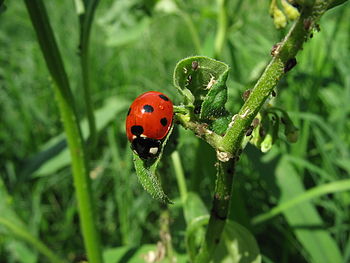1. Keep a journal. Record when you plant, how much you planted, how much you harvested, any bug or disease issues and what you think you might do differently next year. Then next year, refer back to what you wrote. You'll be surprised by how much you can forget in a year if you don't write it down.
 |
| Raised bed of lettuce, tomatoes, 6 different types of basil, marigolds, zinnias, garlic chives, zucchini. (Photo credit: Wikipedia) |
3. Tis better to cover your tender plants before the heavy rain and hail starts, not during. Keep your eye to the sky and take weather forecasts seriously.
4. Every year is different. Don't ever think you've got this thing in the bag, because if you do, you're jinxing your next crop.
5. Plan for moderation. When planning out your garden during the winter, reduce the size and number of plantings you think you want. Looking at those seed catalogs makes you go overboard - I know from experience!
6. It starts and ends with your soil. (I would double-bold that if I could.) The health of your soil is more important than you might realize. Healthy soil makes healthy disease-resistant plants that give a good yield.
Also, it's soil, not dirt. :-)
7. Kitchen gardens are placed near the kitchen for a reason. Gardeners who break their backs digging, hoeing and weeding, don't want to walk too far to pick a few things to go in the dinner.
8. When seed packs say not to plant outside before the first frost date, they mean it. But sometimes you can get away with starting before the approved planting date by using row covers, cold frames, or Wall O' Waters. It's up to you if you want to take your chances.
9. If you're planting a seedling, peat pot and all, tear off the bottom of the pot. The pots are supposed to decompose but that can take a while and you don't want your seedlings to become root-bound.
10. Pole beans aren't the only thing that can climb a trellis; so can cucumbers, melons and squash. Think vertical - especially when you're space-challenged.
11. If you have raised beds, you can use an old window or door screen to cover small seedlings so they're protected from birds, bunnies and bugs.
 |
| Powdery Mildew on a tomato plant. (Photo credit: Wikipedia) |
13. Your tomatoes will never taste exactly the same from year to year; it's going to depend on the weather and water conditions.
14. Water your vegetables in the early mornings. Midday watering can mean evaporation in the hot sun, and can sometimes burn the leaves if they get wet, and nighttime watering might give your plants powdery mildew problems from being moist all night.
These vegetable gardening tips should give you a leg up, but they're only the beginning. For more, get yourself a gardening app for your phone or iPad, read gardening books and magazines, talk to experienced old-timers, and get out there and experience it firsthand. There's nothing more rewarding than growing a successful garden!




